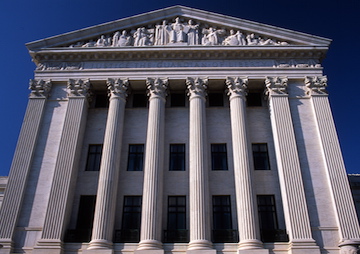Supreme Court Deadlocks on Immigration Ruling That Imperils Millions
Republicans once again push migrants into legal limbo. Wikimedia / CC BY 2.0
Wikimedia / CC BY 2.0
By Steven Rosenfeld / AlterNet
A deadlocked U.S. Supreme Court let a lower court ruling stand that concluded that President Obama acted beyond his authority by issuing executive orders that shielded millions of undocumented immigrants from deportation.
However, President Obama, speaking at the White House, said the Supreme Court’s ruling will not change federal immigration enforcement policy put forth by his administration.
“Enforcement priorities developed by my administration are not affected by this ruling,” he said. “This means that the people who might have benefitted from the expanded deferred action policies — long-term residents raising children who are Americans or legal residents — they will remain low priorities for enforcement. As long as you have not committed a crime, our limited immigration enforcement resources are not focused on you.”
The Court’s 4-4 ruling, which will elevate the issue of immigration reform and the need to fill a high court vacancy on the presidential campaign trail, came as a simple nine-word sentence: “The [lower-court] judgment is affirmed by an equally divided Court.”
With that split, the controlling law is a November 2015 decision of the Fifth Circuit Court of Appeals, which covers Arkansas, Louisiana and Texas, and ruled against the administration. That ruling was from a judge who showed hostility to the White House’s executive orders and the Justice Department’s defense, according to legal scholars.
The case centered on the program known as Deferred Action for Parents of Americans and Lawful Permanent Residents, or DAPA. After years of lobbying from pro-immigrant activists, President Obama created the program by executive order in November 2014.
Under DAPA, certain groups of undocumented immigrants already living in the country were eligible for “deferred action,” shielding them from deportation for three years and letting them legally work in the U.S.
Texas and 25 other states, all led by Republican governors, immediately challenged the program—even though the percentage of undocumented immigrants affected was the same as under executive orders issued by former Republican presidents George H.W. Bush and Ronald Reagan.
The red-state governors put forth an arcane legal argument to challenge the administration’s process of issuing executive orders based on the Constitution’s ambiguous Take Care Clause. The lead plaintiff, Texas, claimed DAPA burdened the states by forcing them to provide government services to great numbers of newly protected immigrants.
The decision was sharply criticized by immigration reform advocates like César J. Blanco, Latino Victory Project interim director.
“We are extremely disappointed,” he said. “While this tie doesn’t set precedent, it is a setback for millions of immigrant families, mixed status families, and U.S. citizens who will remain living in constant fear of being separated from their loved ones. But the fight isn’t over; DACA and DAPA are constitutional, commonsense, and pragmatic programs that are consistent with decades of executive actions taken by past presidents on both sides of the aisle… We are confident this case will make it back to the Supreme Court and be heard by a full panel of Justices who can issue a clear decision.”
Democratic presidential candidate Hillary Clinton also slammed the ruling and the GOP-majority Senate’s refusal to fill a Supreme Court vacancy, saying it throws “millions of families across our country into a state of uncertainty.”
“Today’s deadlocked decision from the Supreme Court is unacceptable, and show us all just how high the stakes are in this election,” Clinton said. “President Obama acted well within his constitutional and legal authority in issuing the DAPA and DACA executive actions. These are our friends and family members; neighbors and classmates; DREAMers and parents of Americans and lawful permanent residents. They enrich our communities and contribute to our economy every day. We should be doing everything possible under the law to provide them relief from the specter of deportation.”
Clinton also said the Republican governors and their party’s presidential nominee Donald Trump were eager to break up immigrant families by police round-up and deportation. In contrast, she pledged to introduce comprehensive immigration reform in her first 100 days in office.
“This decision is also a stark reminder of the harm Donald Trump would do to our families, our communities, and our country,” she said. “Trump has pledged to repeal President Obama’s executive actions on his first day in office. He has called Mexican immigrants ‘rapists’ and ‘murderers.’ He has called for creating a deportation force to tear 11 million people away from their families and their homes.”
Whether or not the Obama administration will be able to bring this case before another federal appeals court in a different part of the country before his term ends is an open question. But law blogs are predicting that there will be more challenges filed by pro-migrant groups in the near future, to try to suspend the Fifth Circuit’s ruling until the matter comes before a fully seated Supreme Court.
In another ruling Thursday, the Court upheld the University of Texas’ affirmative action policy for admissions. The ruling was called a “yellow light” by scholars, meaning universities across the country can make diversity and inclusion goals of admissions processes but will have to follow a careful process in documenting their policies and its impact.
Your support matters…Independent journalism is under threat and overshadowed by heavily funded mainstream media.
You can help level the playing field. Become a member.
Your tax-deductible contribution keeps us digging beneath the headlines to give you thought-provoking, investigative reporting and analysis that unearths what's really happening- without compromise.
Give today to support our courageous, independent journalists.






You need to be a supporter to comment.
There are currently no responses to this article.
Be the first to respond.